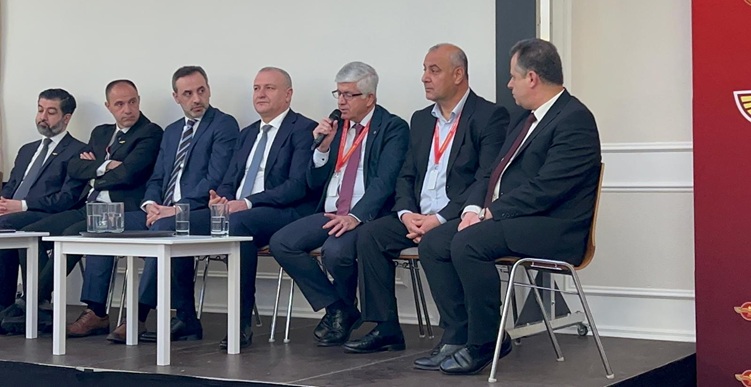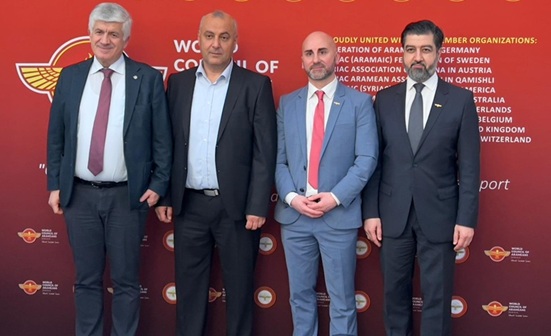World Council of Arameans Syria Conference calls for unity and cooperation
GIESSEN, Germany — The World Council of Arameans (Syriacs) hosted a conference in Giessen, Germany, bringing together Syriac (Aramean–Assyrian–Chaldean) parties, institutions, politicians, and activists.
The conference was held on Saturday January 25 and commenced with an opening prayer led by Syriac Orthodox Archbishop Mor Philoxenus Matthias Nayis who emphasized the significance of unity within the Church.
WCA President Johny Messo delivered the opening speech, highlighting the need for cooperation among the nation’s organizations to achieve collective aspirations. Messo urged collaboration between the Bethnahrin National Council (MUB) and the Assyrian Democratic Organization (ADO) to address challenges facing the Syriac people, particularly in Syria. He called for solidarity to advance justice, preserve their common heritage, and support their people during these critical times.
Expert Lectures and Discussions
The conference featured lectures from professors Dr. Herbert Niehr (Tübbingen) and Dr. Werner Arnold (Heidelberg) on Syria’s history and the Syriac-Aramaic language, the original language of the country.
Panel discussions extended to prominent figures such as Johnny Shabo (Netherlands), Johnny Gabriel (Malloula), Saadallah Barakat (Sadad), Allepine Archbishop Butros Kassis, and activists from Holeb (Aleppo), including Danho Gabriel. Topics ranged from the preservation of Syriac culture to the situation in key Syrian cities like Daramsuq (Damascus), Maaloula, Sadad, Hmoth (Homs), Holeb, and Zalin (Qamishli).
Representatives from various institutions, including Hannibal Yahkub (MUB), Sait Yildiz (ADO), and Melke Toprak (WCA), addressed challenges in safeguarding the Aramaic language and heritage while emphasizing the importance of joint efforts to realize the Syriac people’s aspirations.
MUB Executive Board member Hannibal Yahkub welcomed the Syria Conference as an important step towards collective national demands. In comments to our news desk, he made it clear that the conference should be followed up by round-table discussions between the more politically oriented organizations such as MUB, WCA, and ADO, and social organizations such as the Syriac Churches. He emphasized the importance of such discussions to arrive at common national demands that the individual parties consistently convey in their external political work.
Yahkub cautioned for making the same mistake the Syriacs (Arameans-Assyrians-Chaldeans) made in Iraq where no conformity was reached between the different parties and the autonomous region in the Nineveh Plains, advocated by MUB, did not materialize.

Support from International and Regional Leaders
The event included speeches by lay Church officials such as Adnan Memertas (Germany), David Aslan (Germany), and Ilya Aksan (Netherlands).
German Deputy Foreign Minister Tobias Lindner contributed a video message underlining Germany’s commitment to preserving Syria’s cultural and religious diversity.
Parliamentary representatives, including Isa Kahraman (Netherlands), Yusef Aydin (Sweden), and Daniel Demir (Bundesverband der Aramäer in Deutschland), participated in a panel, alongside Shadi Khalloul, President of the Israeli Christian Aramaic Association, who stressed the importance of political advocacy for Syriac (Aramean–Assyrian–Chaldean) causes.
In his closing remarks, Messo stated that unity among Syriac political parties and institutions could have garnered much more international support during the decades-long conflict in Syria, including the formation of robust military forces. He therefore stated that more such consultations will follow to develop a unified political agenda that will advocate the political and cultural rights of the Syriac people in Syria.
The conference concluded on an optimistic note, with attendees reaffirming their commitment to ongoing cooperation in achieving the goals and aspirations of the Syriac (Aramean–Assyrian–Chaldean) people in Syria.




















